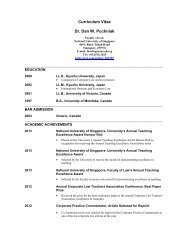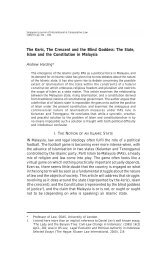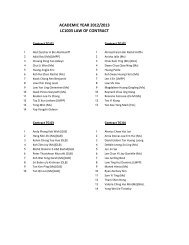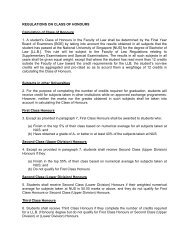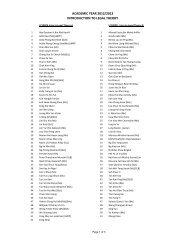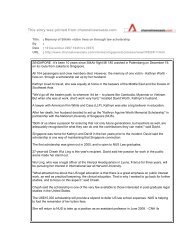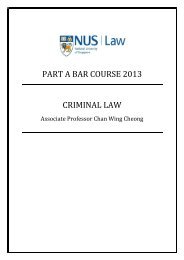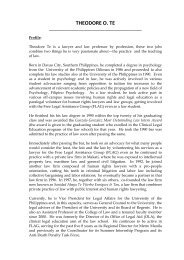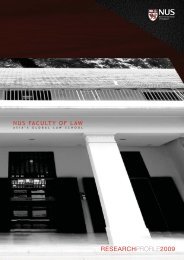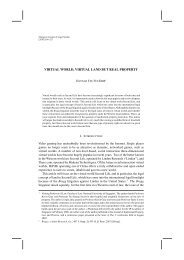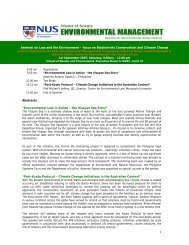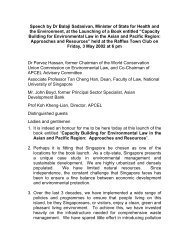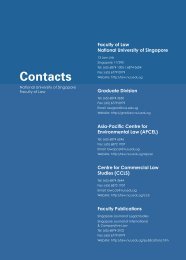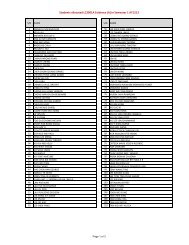Vol 2 No. 2 July - December 2003 - Faculty of Law - National ...
Vol 2 No. 2 July - December 2003 - Faculty of Law - National ...
Vol 2 No. 2 July - December 2003 - Faculty of Law - National ...
- No tags were found...
You also want an ePaper? Increase the reach of your titles
YUMPU automatically turns print PDFs into web optimized ePapers that Google loves.
What are the issues which are close to your heart? With you asChairman, what will the focus <strong>of</strong> the Workers' Party be?We want to move even more towards team leadership. You can’t havea one-man show. With the new team in place, they are good people, wecan move towards a collective leadership.In the face <strong>of</strong> the current economic downturn, we will continue to focuson issues like the cost <strong>of</strong> living, health care, public services. The Workers’Party’s focus has always been on the concerns <strong>of</strong> the working class andthat <strong>of</strong> course is something I’m interested in as well. That will continue.But now, because <strong>of</strong> Singapore’s economic evolution, we have the ‘newpoor’. Traditionally you don’t associate these people with being poor.But you see jobless graduates; people who are paying back loans onassets which have depreciated … These people are also within ourumbrella now.Based on my own experience, personally I will be concentrating on issuesconcerning the legal system, criminal justice and education, areas whereI have some knowledge. As far as legal issues are concerned, I want todeal with things like the way the Court deals with cases – their priorities.There is a very high premium placed on being efficient, but is there atrade<strong>of</strong>f when you are too efficient?I am also concerned with Criminal <strong>Law</strong> – things like the way we passdeterrent sentences, the basis for doing so; and in terms <strong>of</strong> criminalprocedure, how far the accused is protected. The Legal Aid Bureauprovides legal aid for civil cases, subject to a Means Test – which islogical. But for criminal cases, legal aid is provided only for capital cases.Right now, what impoverished accused persons are surviving on is the<strong>Law</strong> Society’s Criminal Legal Aid Scheme, which is run on a voluntarybasis by lawyers who donate their time and resources to do the casespro-bono. You have to ask: is that correct? What if the volunteer lawyersone day decide they don’t have any more resources and nobody comesforward?Why did you go into <strong>Law</strong>?By default! I applied for Medical School first, but they rejected me. <strong>Law</strong>was my second choice. I was interviewed by Pr<strong>of</strong>essors Tan Sook Yeeand Andrew Hicks – when I went in for the interview, Pr<strong>of</strong>essor Tanlooked at my form and said “So, you’re another failed doctor.”!So you wanted to be a doctor?For me, it was a matter <strong>of</strong> wanting to do something which is a publicservice. That fit in quite nicely.At that point I didn’t really have a very clear idea <strong>of</strong> what I wanted to d<strong>of</strong>or the rest <strong>of</strong> my life. I spent at lot <strong>of</strong> time in <strong>Law</strong> School trying to figureout: how does <strong>Law</strong> benefit society? People around me were talking aboutmaking money, doing corporate law; I was not interested in that.Apart from that, legal practice is always glamourisedin shows. But we know that the reality is that it’spretty mundane and the liabilities can be very high.Some people feel that it’s detrimental to the quality<strong>of</strong> their lives. You find people prepared to give upthe money to go into other things, or go in-housewhere the liability is not so high.What are some <strong>of</strong> your memories <strong>of</strong> <strong>Law</strong> School?My best memory would be this: Around 1986-87,when I was in Year 3, the <strong>Law</strong> Society was commentinga lot on legislation, like the Newspaper and PrintingPresses amendments. The government felt that muchmore stringent criteria should be placed on whoshould be elected to the Council <strong>of</strong> the <strong>Law</strong> Society.Many members <strong>of</strong> Council were grilled before theSelect Committee, and the hearings were shown onTV. The government was mooting amendments tothe Legal Pr<strong>of</strong>ession Act, to change the procedureand criteria for election to Council, things like that.We in <strong>Law</strong> School felt that, as future lawyers, weshould say something about these amendments. Weformed a working committee to prepare a report forsubmission to Parliament, and we did that. It was achance for us to use our legal training to contributeto society. I found that very exciting. We called a <strong>Law</strong>Club Extraordinary General Meeting, all the <strong>Law</strong>students were there, and we explained what we weregoing to put in our report. I felt it was extremelymeaningful.On a lighter note, we had a lecturer named MichaelRutter, who was always experimenting with thesemethods to make us learn better. He would do veryunconventional things like getting somebody to playping pong with him in the front <strong>of</strong> the Lecture Hall,to show the shifting <strong>of</strong> the burden <strong>of</strong> pro<strong>of</strong>. One dayhe used yellow lighting and played baroque music,because he had heard that students are able toretain things better if they learn in that environment.So the lights were all low and there was baroquemusic in the background, and he started to lecture.After a while I looked around and saw that somepeople were sleeping! But it’s good that lecturersare interested to improve methods <strong>of</strong> learning.Although I must admit that now I can’t rememberwhat that lecture was about!aLAWmnusFeature III13Why do you think so many people go into <strong>Law</strong> and then leave?I practised for about 4 years; I did litigation work from 1994-98. Thepractice <strong>of</strong> law is quite different from the knowledge <strong>of</strong> law and the study<strong>of</strong> law. I would recommend law studies to people because in anythingthat you do in life, it’s important to know your rights, what it means whenyou sign agreements, to know your remedies. It’s something that everycitizen should know.<strong>No</strong>w it may not be so easy to practice <strong>Law</strong>. There is less litigation worknow, since there are alternative dispute resolution mechanisms. Evenwith those cases that go to court, there is pressure to settle. The pieis getting smaller. Conveyancing is down – there is less volume,transactions are <strong>of</strong> lower value, and now you don’t have scale feesanymore. Solicitors’ work depends on how buoyant the economy is. It’squite difficult.How would you define success? What would it takefor you to say, “I am satisfied, my job is done.”?I have to live with a clear conscience. And to havedone my best in the things that I have chosen to do.I need not be rich or known as the best in my field.For example, with my choice to join the Workers’Party, I would be satisfied if as Chairman I hadmanaged to work with the Party to bring it to a greaterlevel <strong>of</strong> public acceptance and legitimacy; and tohave advanced further in protecting the peoples’interest. It is not that easy to do in our currentclimate, especially since we have limited resources;but if we are able to make some improvementsin that area I think I will be very satisfied.



